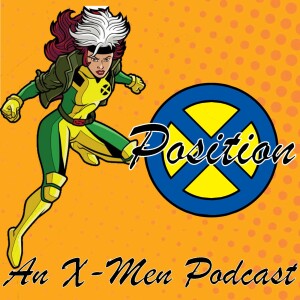
Wednesday Jun 05, 2024
X-Position: An X-Men Podcast #8: The Cure & Come the Apocalypse
"I AM my powers. And the good they can do. For my friends, and for the whole world. I reckon maybe I can live with that after all."
Experts Jenny, Tim, and Keith are back with another double feature and faced with the question: what if the physical condition of mutation could be removed, rendering a mutant indistinguishable from their baseline human peers? This thought experiment has offered some of the richest concepts for exploration across all of X-Men media and drives the central conflict of our two-parter. Would such a mutation "cure" be selfish to pursue? After all, the Spider-Man Principle teaches us that with great power comes great responsibility; that is, a commitment to use said power to the maximum benefit of all. But does such a responsibility exist in a world that would just as soon see its self-appointed protectors erased from existence? Furthermore, wouldn't it be selfish or irresponsible for certain mutants, due to the nature of their powers, NOT to seek a cure if such an option was available? Possessing a dangerous, "always on" power that she cannot consciously control, Rogue is the one main character who represents the best argument in favor of a mutant cure. Her mutation is perhaps the cruelest of all - invisible on the surface, allowing her to easily pass as "normal," yet posing a risk to anyone within arm's reach. To counter this, Rogue must deprive herself even the most fleeting, casual acts of human intimacy. For all the good she can do as a member of the X-Men, it's hard to deny that the removal of her powers wouldn't be a net benefit: not only to Rogue individually, but society at large. There are others who view their mutations very much as gifts and intrinsic to their identities. This is where the series starts to touch upon the concept of mutant pride, and feels ahead of its time in doing so. While a number of X-Men stories can be boiled down to "good" mutants vs. "bad" mutants and the humans caught in the middle - or, the human response to living among mutants - another important dimension to consider is how mutants feel about themselves. On the one had, it would be easy to present the characters with superficially cool, wish-fulfillment powers completely under their control (itself an interesting type of privilege rarely brought up within the franchise) as being dismissive of the cure. Yet as with most things X-Men, the dividing lines are not so clear cut. In the end, the purported cure turns out to be a cautionary tale, with those who volunteered to go through with it ending up far worse off for the experience. Taking the cure off the board in this way may seem a cop-out, but to some extent the show has a moral imperative to do so. After all, there's no cure for any of the real-world stand-ins for mutation that make people "different." And even if there was, the onus isn't on the oppressed to change who they are for the satisfaction of their oppressors. The conclusions drawn and options available are much the same as where we leave this pair of episodes: there's no changing who you are, but you can change the way the world sees you. However unfairly, that burden is laid at the feet of the vulnerable communities most in need of such change. So it goes in life as it does in fiction, with the X-Men persisting in fighting for acceptance by a world that fears and hates them.
X-Position X-TRA: Dr. Adler - presumably the real Dr. Adler - can be seen in a photograph alongside mutant inventor extraordinaire Forge in episode 4 ("Lifedeath," pt. 1) of sequel series X-Men '97. Forge goes on to explain that he worked with the scientist while in the employ of the U.S. Department of Defense. He stopped short of outright developing weapons against mutants, but Adler had no such qualms. Adler used Forge's research and prototypes to create the power-blocking inhibitor collars first seen on Genosha (in "Slave Island"). This same technology was utilized in the development of the neutralizer gun Storm was de-powered by in episode 2 ("Mutant Liberation Begins"). (Also pictured with Adler and Forge, albeit partially obscured? None other than Bastion, leader of the anti-mutant taskforce Operation: Zero Tolerance. The doctor traveled in extremely mixed company.)
Comments (0)
To leave or reply to comments, please download free Podbean or
No Comments
To leave or reply to comments,
please download free Podbean App.